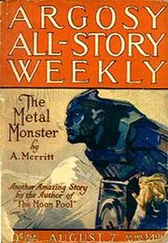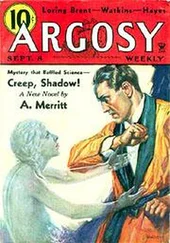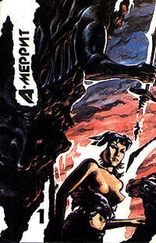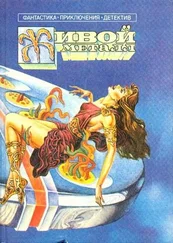Абрахам Меррит - Burn, Witch, Burn!
Здесь есть возможность читать онлайн «Абрахам Меррит - Burn, Witch, Burn!» весь текст электронной книги совершенно бесплатно (целиком полную версию без сокращений). В некоторых случаях можно слушать аудио, скачать через торрент в формате fb2 и присутствует краткое содержание. Год выпуска: 1932, Жанр: Ужасы и Мистика, на английском языке. Описание произведения, (предисловие) а так же отзывы посетителей доступны на портале библиотеки ЛибКат.
- Название:Burn, Witch, Burn!
- Автор:
- Жанр:
- Год:1932
- ISBN:нет данных
- Рейтинг книги:4 / 5. Голосов: 1
-
Избранное:Добавить в избранное
- Отзывы:
-
Ваша оценка:
- 80
- 1
- 2
- 3
- 4
- 5
Burn, Witch, Burn!: краткое содержание, описание и аннотация
Предлагаем к чтению аннотацию, описание, краткое содержание или предисловие (зависит от того, что написал сам автор книги «Burn, Witch, Burn!»). Если вы не нашли необходимую информацию о книге — напишите в комментариях, мы постараемся отыскать её.
Burn, Witch, Burn! — читать онлайн бесплатно полную книгу (весь текст) целиком
Ниже представлен текст книги, разбитый по страницам. Система сохранения места последней прочитанной страницы, позволяет с удобством читать онлайн бесплатно книгу «Burn, Witch, Burn!», без необходимости каждый раз заново искать на чём Вы остановились. Поставьте закладку, и сможете в любой момент перейти на страницу, на которой закончили чтение.
Интервал:
Закладка:
The Dimott report was a simple record with no comment whatever upon grimaces or sounds.
But the doctor who had attended little Anita had not been so reticent.
"The child," he wrote, "had been beautiful. She seemed to suffer no pain, but at the onset of the illness I
was shocked by the intensity of terror in her fixed gaze. It was like a waking nightmare-for
unquestionably she was conscious until death. Morphine in almost lethal dosage produced no change in
this symptom, nor did it seem to have any effect upon heart or respiration. Later the terror disappeared,
giving way to other emotions which I hesitate to describe in this report, but will do so in person if you so
desire. The aspect of the child after death was peculiarly disturbing, but again I would rather speak than
write of that."
There was a hastily scrawled postscript; I could see him hesitating, then giving way at last to the necessity
of unburdening his mind, dashing off that postscript and rushing the letter away before he could
reconsider-
"I have written that the child was conscious until death. What haunts me is the conviction that she was
conscious after physical death! Let me talk to you."
I nodded with satisfaction. I had not dared to put that observation down in my questionnaire. And if it has
been true of the other cases, as I now believed it must have been, all the doctors except Standish's had
shared my conservatism-or timidity. I called little Anita's physician upon the 'phone at once. He was
strongly perturbed. In every detail his case had paralleled that of Peters. He kept repeating over and
over:
"The child was sweet and good as an angel, and she changed into a devil!"
I promised to keep him apprised of any discoveries I might make, and shortly after our conversation I
was visited by the young physician who had attended Hortense Darnley. Doctor Y, as I shall call him,
had nothing to add to the medical aspect other than what I already knew, but his talk suggested the first
practical line of approach toward the problem.
His office, he said, was in the apartment house which had been Hortense Darnley's home. He had been
working late, and had been summoned to her apartment about ten o'clock by the woman's maid, a
colored girl. He had found the patient lying upon her bed, and had at once been struck by the expression
of terror on her face and the extraordinary limpness of her body. He described her as blonde,
blue-eyed-"the doll type."
A man was in the apartment. He had at first evaded giving his name, saying that he was merely a friend.
At first glance, Dr. Y had thought the woman had been subjected to some violence, but examination
revealed no bruises or other injuries. The "friend" had told him they had been eating dinner when "Miss
Darnley flopped right down on the floor as though all her bones had gone soft, and we couldn't get
anything out of her." The maid confirmed this. There was a half-eaten dinner on the table, and both man
and servant declared Hortense had been in the best of spirits. There had been no quarrel. Reluctantly, the
"friend" had admitted that the seizure had occurred three hours before, and that they had tried to "bring
her about" themselves, calling upon him only when the alternating expressions which I have referred to in
the case of Peters began to appear.
As the seizure progressed, the maid had become hysterical with fright and fled. The man was of tougher
timber and had remained until the end. He had been much shaken, as had Dr. Y, by the after-death
phenomena. Upon the physician declaring that the case was one for the coroner, he had lost his
reticence, volunteering his name as James Martin, and expressing himself as eager for a complete
autopsy. He was quite frank as to his reasons. The Darnley woman had been his mistress, and he "had
enough trouble without her death pinned to me."
There had been a thorough autopsy. No trace of disease or poison had been found. Beyond a slight
valvular trouble of the heart, Hortense Darnley had been perfectly healthy. The verdict had been death by
heart disease. But Dr. Y was perfectly convinced the heart had nothing to do with it.
It was, of course, quite obvious that Hortense Darnley had died from the same cause or agency as had all
the others. But to me the outstanding fact was that her apartment had been within a stone's throw of the
address Ricori had given me as that of Peters. Furthermore, Martin was of the same world, if Dr. Y's
impressions were correct. Here was conceivably a link between two of the cases-missing in the others. I
determined to call in Ricori, to lay all the cards before him, and enlist his aid if possible.
My investigation had consumed about two weeks. During that time I had become well acquainted with
Ricori. For one thing he interested me immensely as a product of present-day conditions; for another I
liked him, despite his reputation. He was remarkably well read, of a high grade of totally unmoral
intelligence, subtle and superstitious-in olden time he would probably have been a Captain of
Condettieri, his wits and sword for hire. I wondered what were his antecedents. He had paid me several
visits since the death of Peters, and quite plainly my liking was reciprocated. On these visits he was
guarded by the tight-lipped man who had watched by the hospital window. This man's name, I learned,
was McCann. He was Ricori's most trusted bodyguard, apparently wholly devoted to his white-haired
chief. He was an interesting character too, and quite approved of me. He was a drawling Southerner who
had been, as he put it, "a cow-nurse down Arizona way, and then got too popular on the Border."
"I'm for you, Doc," he told me. "You're sure good for the boss. Sort of take his mind off business. An'
when I come here I can keep my hands outa my pockets. Any time anybody's cutting in on your cattle,
let me know. I'll ask for a day off."
Then he remarked casually that he "could ring a quarter with six holes at a hundred foot range."
I did not know whether this was meant humorously or seriously. At any rate, Ricori never went anywhere
without him; and it showed me how much he had thought of Peters that he had left McCann to guard him.
I got in touch with Ricori and asked him to take dinner with Braile and me that night at my house. At
seven he arrived, telling his chauffeur to return at ten. We sat at the table with McCann, as usual, on
watch in my hall, thrilling, I knew, my two night nurses-I have a small private hospital adjunct-by
playing the part of a gunman as conceived by the motion pictures.
Dinner over, I dismissed the butler and came to the point. I told Ricori of my questionnaire, remarking
that by it I had unearthed seven cases similar to that of Peters.
"You can dismiss from your mind any idea that Peters' death was due to his connection with you,
including the tiny globes of radiance in the blood of Peters."
At that his face grew white. He crossed himself.
"La strega!" he muttered. "The Witch! The Witch-fire!"
"Nonsense, man!" I said. "Forget your damned superstitions. I want help."
"You are scientifically ignorant! There are some things, Dr. Lowell-" he began, hotly; then controlled
himself.
"What is it you want me to do?"
"First," I said, "let's go over these eight cases, analyze them. Braile, have you come to any conclusions?"
"Yes," Braile answered. "I think all eight were murdered!"
CHAPTER III: THE DEATH AND NURSE WALTERS
That Braile had voiced the thought lurking behind my own mind-and without a shred of evidence so far
Читать дальшеИнтервал:
Закладка:
Похожие книги на «Burn, Witch, Burn!»
Представляем Вашему вниманию похожие книги на «Burn, Witch, Burn!» списком для выбора. Мы отобрали схожую по названию и смыслу литературу в надежде предоставить читателям больше вариантов отыскать новые, интересные, ещё непрочитанные произведения.
Обсуждение, отзывы о книге «Burn, Witch, Burn!» и просто собственные мнения читателей. Оставьте ваши комментарии, напишите, что Вы думаете о произведении, его смысле или главных героях. Укажите что конкретно понравилось, а что нет, и почему Вы так считаете.

![Абрахам Меррит - Лунный бассейн [Лунная заводь]](/books/20623/abraham-merrit-lunnyj-bassejn-lunnaya-zavod-thumb.webp)









